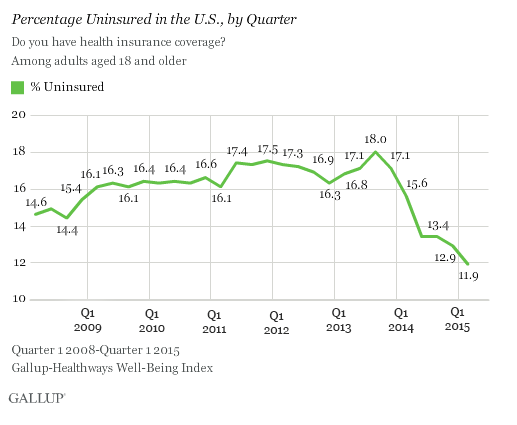More Americans Have Health Insurance (Whether They Want it or Not)

The latest Gallup survey shows the rate of American adults without health insurance dipped to an all-time-low of 11.9 percent in the first quarter of this year, down from 12.9 percent at the end of 2014 and 18 percent in mid-2013. That means nearly nine in 10 adults now say they have health coverage, which Gallup attributes primarily to provisions in the Affordable Care Act.
So far, the White House estimates that more than 16 million people have gained health coverage through Obamacare.
Related: Obamacare Goes to Court as Uninsured Rate Hits New Low

Gallup notes that the uninsured rate is likely to continue trending downward this year as more people sign up for coverage during the special enrollment period, which ends on April 30. The administration granted extra time to people who were unaware of the law’s individual mandate requiring everyone to have health coverage or be subject to a tax penalty.
The pollsters noted that there are, of course, other factors that have helped lower the percentage of uninsured people in the U.S., including the improving economy and a falling unemployment rate. Even so, they suggested that Obamacare played the largest role: “The uninsured rate is significantly lower than it was in early 2008, before the depths of the economic recession, suggesting that the recent decline is due to more than just an improving economy.”
Related: Poll Shows Why Obamacare Ruling Could Be Devastating
The poll of 43,575 adults over the first three months of the year suggests that the health care reform law is succeeding in its primary goal of expanding access to coverage, though questions remain about just how affordable that care is — and whether the law will be undone by a Supreme Court ruling, scheduled to be announced in June in the case of King v Burwell. The high court’s interpretation of language in one sentence of the Affordable Care Act will determine whether roughly 8 million people will lose health insurance subsidies. Read about the case here.
Top Reads from The Fiscal Times:
- 6 Popular Social Security Myths Busted
- The Battle Is On to Save Military Bases from Closure
- The 10 Worst Places for Obamacare in 2015
Chart of the Day: Why US Fertility Rates Are Falling

U.S. fertility rates have fallen to record lows for two straight years. “Because the fertility rate subtly shapes many major issues of the day — including immigration, education, housing, the labor supply, the social safety net and support for working families — there’s a lot of concern about why today’s young adults aren’t having as many children,” Claire Cain Miller explains at The New York Times’ Upshot. “So we asked them.”
Here are some results of the Times’ survey, conducted with Morning Consult. Read the full Times story for more details.
A Record Low 47% of US Adults Say They're 'Extremely Proud' to Be American
Gallup says that, for the first time in the 18 years it’s been asking U.S. adults how proud they are to be Americans, fewer than half say they are "extremely proud." Just 47 percent now say they’re extremely proud, down from 70 percent in 2003.
Another 25 percent say they’re “very proud” — but the combined 72 percent who say they’re extremely or very proud is also the lowest Gallup has recorded. Pride levels among liberals and Democrats have plunged since 2017. Overall, 74 percent of Republicans and just 32 percent of Democrats call themselves “extremely proud” to be American.
Pfizer Has Raised Prices on 100 of Its Products

Weeks after President Trump said that drugmakers were about to implement “voluntary massive drops in prices” — reductions that have yet to materialize — Pfizer has raised prices on 100 of its products, The Financial Times’s David Crow reports:
“The increases were effective as of July 1 and in most cases were more than 9 per cent — well above the rate of inflation in the US, which is running at about 2 per cent. … Pfizer, the largest standalone drugmaker in the US, did decrease the prices of five products by between 16 per cent and 44 per cent, according to the figures.”
Crow notes that Pfizer also raised prices on many of its medicines in January, meaning that some prices have been hiked by nearly 20 percent this year. The drugmaker said that it was only changing prices on 10 percent of its medicines and that list prices did not reflect what most patients or insurers actually paid. The net price increase after rebates and discounts was expected to be in the “low single digits,” the company told the FT.
Chart of the Day: Pass-Through Tax Deductions Made Easy

The Republican tax overhaul was supposed to simplify the tax code, but most experts say it fell well short of the goal. Martin Sullivan, chief economist at Tax Analysts, tweeted out a chart of the analysis required to determine whether income qualifies for the passthrough tax deduction of 20 percent, and as you’ll see, it’s anything but simple.
A Conservative Bashes GOP Dysfunction on Spending Cuts

Brian Riedl, a senior fellow at the conservative Manhattan Institute, offers a blistering critique of congressional Republican’s problems cutting spending:
Since the Republicans took the House in 2011, nearly every annual budget blueprint has promised to balance the budget within a decade with anywhere from $5 trillion to $8 trillion in spending cuts. And yet, you may have noticed, the budget has not moved towards balance. This is because the budget merely sets a broad fiscal goal. To actually cut spending, Congress must follow up with specific legislation to reform Medicare, Medicaid, and all the other targeted programs. In reality, most lawmakers who pass these budgets have no intention whatsoever of cutting this spending. As soon as the budget is passed, the targets are forgotten. The spending-cut legislation is never even drafted, much less voted on.
The annual budget exercise is thus a cynical exercise in symbolism. Congress calculates how much spending must be cut over ten years to balance the budget. Then they pass legislation setting a goal of cutting that amount. Then they move on to other business. It’s like a baseball team announcing that they voted to win the next World Series, and then not showing up to play the season.
Read the full piece at National Review.




